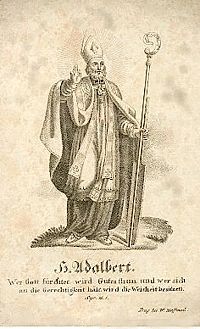Adalbert of Magdeburg
Adalbert of Magdeburg | |
|---|---|
 Holy Card for St. Adalbert of Magdeburg | |
| Archbishop of Magdeburg and Abbot of Wissembourg | |
| Born | c. 910 Alsace or Lorraine, France |
| Died | 20 June 981 (aged 70–71) Zscherben |
| Venerated in | Eastern Orthodox Church Roman Catholic Church |
| Feast | 20 June |
Adalbert of Magdeburg (c. 910 – 20 June 981), sometimes incorrectly shortened to "Albert", known as the Apostle of the Slavs, was the first Archbishop of Magdeburg (from 968)[1] and a successful missionary to the Polabian Slavs to the east of what was contemporarily Germany. He was later canonised and his liturgical feast day was assigned as 20 June.
Life
Adalbert was born c. 910, possibly in Alsace or Lorraine, France. He was a German monk at the Benedictine Monastery of St. Maximinus in Trier, Germany. He was consecrated a Roman Catholic bishop and in 961 was sent to Kievan Rus. Princess Olga of Kiev had asked Emperor Otto I (the Great) to provide her a missionary from the Roman Catholic Church.[2] Her son took the crown from her in 961, just as Adalbert arrived in Kievan Rus. Adalbert's missionary companions were slain and Adalbert barely escaped. Kievan Rus subsequently was converted by missionaries from Constantinople and became part of Byzantine Christianity.
Upon escaping Kievan Rus, Adalbert traveled to the imperial court at Mainz, Germany, where he remained for four years, until he was named Abbot of Wissembourg in Alsace. There he worked to improve the education of the monks.[3] He later became the first Archbishop of Magdeburg, Saxony-Anhalt, in contemporary Germany.[2] Adalbert travelled to Rome to receive the pallium before assuming his see.[4]
The Archiepiscopacies of Hamburg and Bremen had been established with the intention that they would serve as bases for missions in northern and eastern Europe. The Archdiocese of Magdeburg was designated to provide missionaries to the eastern European Slavs.[5] Adalbert also established dioceses for Naumburg; Meissen; Merseburg; Brandenburg; Havelberg; and Poznań, Poland. He died on 20 June 981[3] in Zscherben (contemporarily in (former) Geusa, in Merseburg, Saxony-Anhalt, Germany).
A student of Adalbert for some years named Vojtěch Slavníkovec, who at his Confirmation, took the very name of his tutor, went on from Adalbert's tutelage to successfully evangelize many Slavic peoples, received the crown of martyrdom in Prussia, and was canonized as St. Adalbert of Prague.
Saint Adalbert's Cemetery in Milwaukee, Wisconsin, is dedicated to the archbishop of Magdeburg.[6]
References
- ^ Thorne, John; Collocott, T. C. (1990) [1964]. Chambers Biographical Dictionary. Edinburgh: Chambers. p. 7. ISBN 0-550-16041-8. OCLC 502219677.
- ^ a b Campbell, Thomas (1907). "St. Adalbert". The Catholic Encyclopedia. Vol. 1. New York: Robert Appleton Company. Retrieved 25 March 2015 – via New Advent.
- ^ a b Delaney, John J. (2005). "Adalbert of Magdeburg". Dictionary of Saints. Image/Doubleday. ISBN 9780385515207.
- ^ Michałowski, Roman (2016). The Gniezno Summit: The Religious Premises of the Founding of the Archbishopric of Gniezno. Brill. p. 96. ISBN 9789004317512.
- ^ "Adalbert of Magdeburg". The Oxford Dictionary of Saints. Oxford University Press. Retrieved 20 June 2020 – via Oxford Reference.
- ^ "Generations of the local Polish community memorialized at Saint Adalbert's in the Garden District". Milwaukee Independent. 31 October 2019. Retrieved 20 June 2020.
Further reading
- Attwater, Donald; John, Catherine Rachel (1995) [1965]. The Penguin Dictionary of Saints (3rd ed.). London: Penguin. ISBN 0-14-051312-4. OCLC 60310282.
